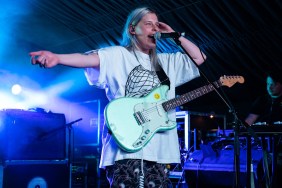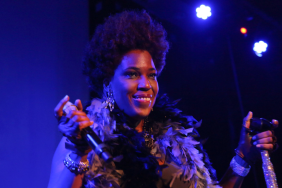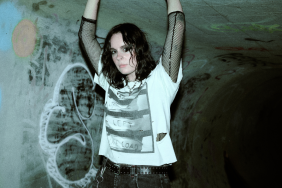Sage Francis is one of those rare artists who have the courage to step out against the expectations of his fans. Refusing to have his creativity dictated by anyone other than himself, his latest album Li(f)e has seen him take the music in a different and, dare I say, poppier direction, leaving behind his hard beat laden style and trading it for instrumentals written by the likes of Chris Walla of Death Cab For Cutie and writer of the Amelie soundtrack Yann Tierson.
Having always been a bit of a target for hip hop fundamentalists, his performance at Rock The Bells was a legendary example of him spitting in the face of what is perceived as hip hop, Sage is somewhat used to copping guff from these swine (including yours truly in this last case), turning the other cheek toward the critics, content with forging his own way of developing his own form of self expression.
On his way over to Australia for a run of dates around Melbourne Festival, we caught up with Sage to discuss his choice of direction, the criticisms and why he’s chosen to take a tour hiatus after this last world tour.
Music Feeds: So you’ve taken a turn in a new direction with the sound on your latest album. Obviously you were going for a more live band sound?
Sage Francis: The band sound was certainly intentional. When we went into making this record we wanted to have a unique sound, one that separated it from previous albums that I had done, and we took considerable measures to make sure that that was the case. We understood the risk in that; we understood that it might push away some of my listeners or the core hip hop base. I don’t even know that anyone outside of our genre would be like ‘oh cool,’ I don’t know, but for my own sake and for my own sense of reward I wanted to do that. So we reached out to various musicians and bands, told them what we were trying to do and waited for them to send demos to us. Eventually I got enough pieces of music from people where I could make enough demos to constitute an album and once that happened we had to re-record everything. I mean I did demos in my house. I recorded all the stuff in my house and I had to change some of the arrangements, but eventually we recorded it all in the same place in this studio in Chicago with the producer, Brian Deck. He was brought on board because his forte is working with musicians and getting the right sound out of them, and all the technical stuff that I certainly have no idea about.
MF: Was this an offshoot from touring with Gruvis Malt a few years back?
SF: When I first recorded in an official studio, on my very first album we sued a live band called A.O.I, which stands for Art Official Intelligence. That was back in 97, 98 and that whole album was live instruments, and it’s something a lot of people aren’t’ aware of. When we came out with this album it seemed, I guess, novel to a lot of people, like ‘now you’re doing something with a live band?’ It’s something I have done before. I’m familiar with it. I mean that was the first band I did a bunch of local shows with, and I’m familiar with working with musicians and bands and every tour that I’ve done, almost every single tour I’ve done in North America, has been with a different band backing me, so there’s a bit of history there between me working with live musicians and it probably helped out when it came to working on this project and me understanding what the possible pitfalls between and Emcee and a band that doesn’t typically work with hip hop.
MF: I thought you generally worked solo with a CD player on stage. Does this mean we get the band this time round when you’re over here?
SF: Unfortunately I’m not bringing a live band with me to Australia, I just can’t – it’s too much trouble. It’s just too much of an expense and if I did have to bring a live band I probably wouldn’t even be able to make a tour out of it. But I’m making due and I’m making sure that I’m still able to perform these songs for my fans. Personally I don’t care to play with a live band; I don’t care one way or the other. I’m very comfortable and happy to perform songs solo on stage and those happen to be some of my better shows, unless it needs to be a live band, but I don’t when it isn’t necessary.
MF: Personally I think the solo act on stage is great; it takes a lot of courage to stand on stage alone and entertain a crowd of people.
SF: I think the symbolism of that is really strong. So much of what we do relies on what we say as hip hop artists, as Emcees, and I know that the traditionalist’s heads will probably explode or something, but not even having a DJ, just nobody. Nobody on stage except for the Emcee, handling DJ duties himself and letting his word entertain the crowd and just totally being a solo artist on stage, just like a folk artist would go out with their guitar and that’s that; it doesn’t have to be a big production, if your strength is in your words, then you should be able to step in front of an audience of any size and be able to entertain them, and that’s something that I’m very glad I’m able to do.
MF: So it’s just you this time then?
SF: I’m bringing my partner B Dolan, who is an artist I worked with on this record. His album was produced by Alias, and he’s amazing. I’ve been working with him for about five years now, five or six years. We created a website together called KnowMore.org, that was his brainchild, I just helped kind of promote it and I funnelled money into it so that it exists, but he’s a genius man, I just kinda like keeping people like that around me and I can build off them and we build off each other. So he’ll be coming out with me, we’ll be doing songs together; he’ll also do his own set and that’s it, it’s just me and him and we’re touring the world together.
MF: So he’s like a DJ then, he’ll be backing you up?
SF: We’re going off CDs, and he’ll be rapping and doing his own set.
MF: Cool. Anyway, aside from the shift in the sound of the album, your delivery seems to have softened somewhat from the earlier work?
SF: You know I haven’t really heard that from any interviewers or reporters or even fans and you’re the second person to say it tonight, and I agree with you completely. It’s true there is a more toned down delivery on this album; it’s not as in your face, it’s not as angsty, it’s really more of a tempered conversational tone. I don’t know why that is. It might be because of older age, it might be just that I’m adapting to the music I’m performing over. Unlike previous records, it’s not hard beats; it’s a different type of music, so I work with that, I adapt to it and that’s kind of the delivery that came out of me due to the music that I’m performing with. There’s also the other element there where Brain Deck, who produced the album, while I was performing there was a couple of times where he preferred the more laid back approach rather than the more aggressive delivery and after hearing the different takes I agreed with him that I liked the laid back approach more. The two songs in particular that that worked on was a song called The Best Of Times, and a song called Sixteen Years.
MF: I wanted to ask you about The Best Of Times, actually; the msuic was written by Yann Tierson who I love. How did that come about?
SF: I’ve been a huge a fan of Yann Tierson for five years. He’s incredible, I’d be so lucky to have a full album done by him, maybe I should just kind of send him more emails and bug the hell out of him, but I kind of feel lucky enough that he sent me one piece for me to work with and it definitely turned into one of my favourite songs that I have ever done. The way that came about is we share the same booking agent and that booking agent told me that he was talking to Yann and talking to him about my album and he asked me, “Do you want music from Yann for your album?” So I was like “yeah, definitely”. But I didn’t really believe; I never believed I was going to get music from Yann even after he said that and the music didn’t come in to me till the eleventh hour. It was a day before my last recording session and finally I got an email with an MP3 attached, which is the music that you now hear on The Best Of Times, so I had to write that song in one night and record it the next day and that was that.
MF: That sounds pretty intense.
SF: It was nerve wracking, it truly was. Here I am, I’m a huge fan of this guy, I loved the music that he sent, but it wasn’t the kind of music that would fit any kind of rap song, so I had to really think about it and figure out how the hell am I going to make my stuff work over this and it took a lot of thought and a lot of meditation and eventually the words started coming out and I was just lucky man, I was just so thankful that I fell upon this idea that turned into what is now The Best Of Times. It was definitely not the typical fashion in which I make songs, so it’s unique in a lot of ways.
MF: Yeah it’s my favourite song on the record, and I like that it’s the sort of send off song. Ballsy move, I mean it lets things finish on a bang, but you also run the risk of people missing it.
SF: I don’t know why I do that, but it seems like whenever I put together an album I tend to like to bookend them with what I think are the most epic songs.
MF: Fair enough. Moving on, I was curious to ask if you’d been copping any flack from the shift in style. I know you’ve gotten a lot of criticism back in the day about not being hip hop enough; have people gotten over it yet, or are they still slinging shit?
SF: I would have expected by now that they would be over it, but I still caught flack from this record where people were pretending like they should expect another boom-bap record from me, and I don’t know why. I’ve been travelling my own path for a while now, always try to do something new and something surprising with every record and this album was no exception, and so the people who keep expecting a hip hop record that sounds familiar to them to come out of me considering the kind of stuff that I rap about and the course that my career has taken – it’s just strange.
MF: That’s the problem with being popular though, people develop expectations and they get angry if you don’t meet them. I know plenty of bands who, having moved on from their earlier style, still get requests for songs they couldn’t even play anymore at their live shows…
SF: You know what’s weird is that I don’t mind it at shows. I will go back ten, I’ll go back fifteen years, I don’t give a fuck; at a show I’m there to entertain people, I want them to see these songs come to life and I do that. At my shows I’m covering my whole career, I’m going through my whole catalogue, I’m doing stuff from the new album as well as my first album, and I like to do that. I show respect to my old material, I don’t diss it, I don’t say ‘oh that shit’s whack because it’s old,’ I actually like my old material just as much as my fans do. But at the same time there are artists out there who continue to make the same record over and over again because the fans might pressure them to do that or the critics might pressure them. And it’s scary to change things up because we work so hard to get that initial respect and appreciation and then who’s dumb enough to throw that away and start all over again… me.
MF: Haha, I know what you mean, you could always work under a new name or something, sort of imply a shift in tone.
SF: Like Mike Patton, he does that. But I’ve spent too much time building a certain reputation with this name that I’ve been reluctant to release stuff under other names, but there’s a strong possibility I’ll be doing that in the future.
MF: Speaking of the future, you’re going on hiatus? Does this mean no new Sage for a while?
SF: It’s a tour hiatus, it’s me deciding that I’m not going to pack up and leave my home and my home-base for too long after this, it’s really my need to stay centred and stationary so I can handle a lot of business and personal things and also work on different music rather than leave it all, abandon it and go out and continue to do more shows. I’ve done that for ten years and I’ve still been able to maintain my business, but at the same time everything is kind of falling apart in my personal life and I’m just sick of that, it’s taking its toll and I want to try and figure out something new for myself, so we’ll see what happens. I got a lot of things planned, and I look forward to pursuing those in the next year.
MF: It’s just all getting a bit much then?
SF: For some reason I get more and more anxious about shit; anxieties have gone way up in the past few years; I can’t do it anymore. I mean I’m not a social person, to be around a lot of different people who have various expectations of me, it’s not something I’m able to deal with all that well. When I’m in a crowd situation or just being around people in general it’s not normal for me. I live by myself, I do everything on my own in my house, I live alone and that’s just my nature and I’d like to work on that some more.












